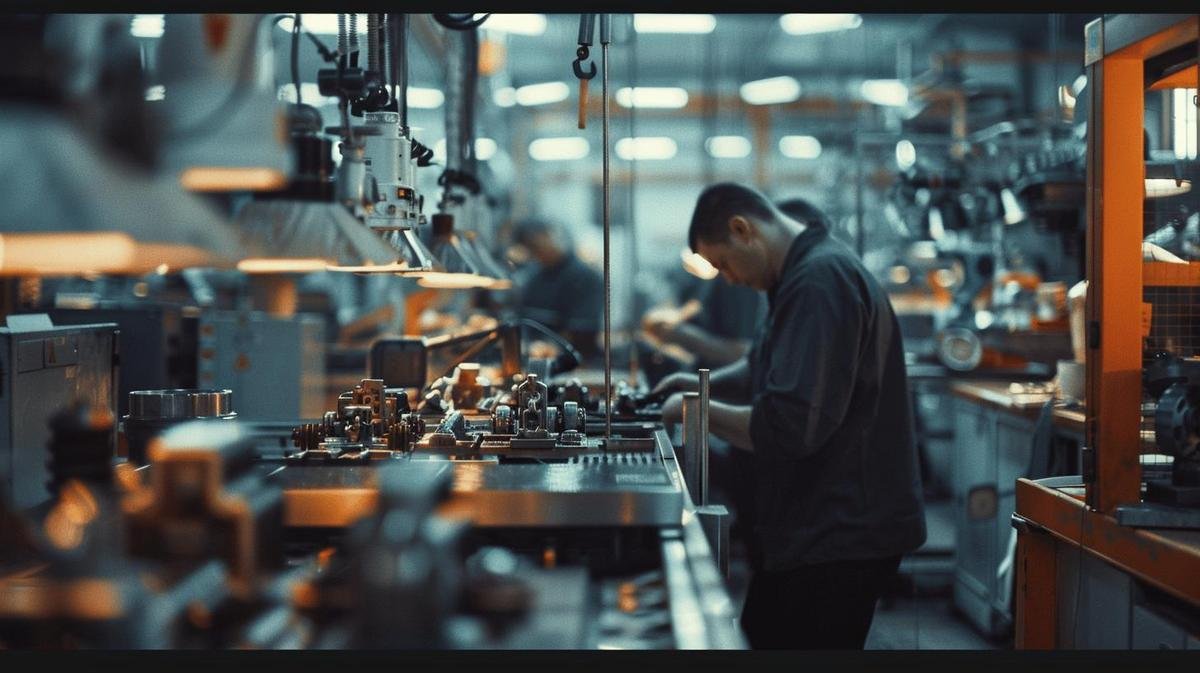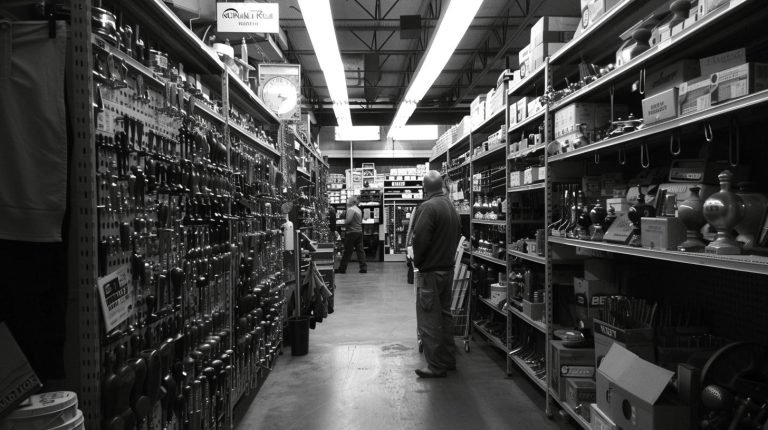Maintaining high quality in door lock manufacturing is crucial for ensuring product reliability, security, and customer satisfaction. This blog post delves into the detailed processes and rigorous quality control measures employed by door lock factories. By examining the stages from raw material selection to final assembly, as well as differentiating between the production of smart and mechanical locks, we provide a comprehensive overview of how quality is preserved at every step. Additionally, we highlight the latest innovations in factory automation, prominent factories known for electronic lock manufacturing, and the best practices deployed to maintain and exceed security standards. Join us as we explore “Door Lock Factory: How Does It Maintain Quality?” and gain insight into the intricacies of lock production and quality assurance.
What is the Door Lock Manufacturing Process?
Overview of Steps Involved in Door Lock Production
The door lock manufacturing process is a meticulously organized sequence of steps designed to transform raw materials into secure, reliable door locks. This process begins with the selection of high-quality raw materials such as steel, brass, and other robust metals. The precision machining of these materials into various components, including the lock body, cylinder, and key, forms the cornerstone of production.
Following the initial machining phase, components undergo heat treatment to enhance their durability and strength. Precision assembly follows, where each part is meticulously put together to form a functional lock system. Every component must align perfectly to ensure smooth operation and security.

door lock manufacturing
Key Stages from Raw Materials to Finished Product
The process from raw materials to a finished door lock can be classified into several key stages:
- Raw Material Sourcing and Cutting: The process starts with sourcing high-grade metals. These materials are then cut into specific shapes and sizes needed for different lock components.
- Machining and Shaping: Advanced CNC (Computer Numerical Control) machines are used for precise shaping and detailing of components. This stage ensures that all parts meet exact industry specifications.
- Heat Treatment and Surface Finishing: Components undergo heat treatment to improve their mechanical properties. Surface finishing through processes such as electroplating or powder coating adds an extra layer of protection against corrosion.
- Assembly: All the treated and finished parts are assembled to form a complete lock. This meticulous process includes fitting the lock cylinder, engaging the tumblers and springs, and incorporating the key mechanism.
- Quality Control and Testing: Rigorous quality control ensures that each lock meets security standards and operates flawlessly. Each batch undergoes mechanical testing, durability testing, and sometimes, integration testing for smart locks.
Differences in Manufacturing Processes for Smart and Mechanical Locks
The manufacturing processes for smart locks and traditional mechanical locks diverge significantly due to the additional complexity and technology involved in smart locks.
- Mechanical Locks: These locks require extensive precision machining and assembly. The primary focus is on the mechanical alignment and strength of physical lock parts such as tumblers, springs, and lock bodies.
- Smart Locks: The production of smart locks involves not only mechanical assembly but also the integration of electronic components such as sensors, circuit boards, and wireless communication modules. Additional steps include software installation, testing for connectivity, and security enhancements like encryption.
Understanding these complexities highlights why smart lock manufacturing often requires advanced facilities and specialized knowledge. For more detailed insights into the intricacies of door lock production, you can explore this detailed overview.
In conclusion, the meticulous door lock manufacturing process ensures that each product—from mechanical to smart locks—is robust, reliable, and ready to provide security.
How is Quality Control in Door Lock Manufacturing Ensured?

door lock factory workers
Quality Control Measures
Quality control in door lock manufacturing comprises rigorous checks and balances throughout the entire production process. Leading manufacturers such as Mul-T Lock and Sierra Pacific Engineering & Products (SPEP) implement systematic quality control measures. Factories use a series of standardized inspections at various production stages, from raw materials to final assembly. Starlight Lock, for instance, examines the quality of metals and components before they enter the assembly line to ensure consistency and durability.
Testing Procedures
Comprehensive testing procedures are crucial to guarantee product reliability and durability. Factories conduct mechanical stress tests, durability tests, and environmental resilience assessments to ensure that the locks can withstand different conditions. For example, Ranger Lock, known for its durable products since 2002, subjects their ATF-Compliant Lock Box to multiple tests that simulate real-world usage to verify that their products meet and exceed industry standards.
Certifications and Standards
Adherence to industry certifications and standards is fundamental for ensuring quality and trustworthiness in door lock manufacturing. ISO certifications, such as ISO 9001 2000 for quality management and ISO 14001 for environmental management, are examples of internationally recognized standards that leading manufacturers comply with. These certifications ensure that manufacturing processes are efficient and meet high-quality standards, as exemplified by Mul-T Lock’s adherence to these certifications. By maintaining such standards, door lock manufacturers not only assure the quality but also the safety and reliability of their products.
What Are the Innovations in Door Lock Factory Automation?
Advanced Machinery and Robotics
The deployment of advanced machinery and robotics in door lock factories signifies a massive leap in production capabilities. State-of-the-art robotic arms, precision CNC machines, and automated assembly lines ensure consistent quality and high throughput. For example, Mul-T Lock adopts robotic handlers that facilitate precision components installation, reducing human error and enhancing output accuracy. This innovation enables the factory to produce highly reliable, standardized locks at a faster rate, lowering operational costs and increasing production speed.
Benefits of Factory Automation
Factory automation in door lock production yields several pivotal benefits. Firstly, it significantly improves production efficiency by minimizing human intervention, thereby shortening cycle times and increasing productivity. Secondly, automation reduces the likelihood of defects, ensuring a higher standard of product quality. Thirdly, it enhances worker safety by handling tasks that are hazardous or repetitive. Automation also enables real-time monitoring and data collection, facilitating better decision-making and optimized resource utilization.
Case Studies of Factories Implementing Innovative Technologies
Several door lock manufacturers have already harnessed the power of innovative technologies to advance their production lines. For instance, Sierra Pacific Engineering & Products (SPEP) utilizes ISO-certified automated systems that streamline the manufacturing of industrial hardware, highlighting their commitment to quality, service, and value. Leading Lock Manufacturers, known for a wide array of security devices, integrates smart automation techniques that include AI-driven quality assessments during assembly, ensuring each product adheres to stringent quality standards.
In conclusion, the integration of advanced machinery, robotics, and automated systems in door lock factories plays a crucial role in improving production efficiency and maintaining high product quality. By adopting these technologies, manufacturers not only enhance their output but also uphold rigorous quality assurance measures, ultimately benefiting consumers with reliable security solutions.
Which Factories Are Known for Expertise in Electronic Lock Manufacturing?

Leading Factories Specializing in Electronic and Smart Locks
In the realm of electronic lock manufacturing, several factories stand out for their innovation and quality. One such example is Mul-T Lock, a global leader known for using state-of-the-art technologies to create some of the most secure electronic and smart door locks available. With ISO 9001 2000 and ISO 14001 certifications, Mul-T Lock ensures that each lock produced meets rigorous quality standards.
Another major player is Sierra Pacific Engineering & Products (SPEP), an ISO-certified provider acclaimed for its industrial hardware. SPEP emphasizes quality, service, and value, offering an extensive range of electronic locks designed for both commercial and residential applications.
Unique Features and Technologies
Mul-T Lock offers several unique technologies, such as its advanced electro-mechanical locking systems that combine traditional locking mechanisms with digital control. This integration enhances security while offering users greater control over their locks via mobile applications.
SPEP employs cutting-edge manufacturing techniques to develop electronic locks known for their durability and user-friendly interfaces. This includes features like remote access, biometric entry, and tamper-proof designs, combining technology and usability to meet diverse consumer needs.
Comparison of Product Quality and Market Reputation
Both Mul-T Lock and SPEP have established reputations for producing high-quality, reliable locks. Mul-T Lock, with its global reach and constant innovation, is highly regarded for its premium security solutions. These locks are trusted by both residential customers and large enterprises looking for robust safety measures.
On the other hand, SPEP is celebrated for its value-driven approach, providing durable and cost-effective solutions without compromising on quality. This makes SPEP a preferred choice for businesses seeking reliable yet affordable electronic locking systems.
In summary, when looking for expertise in electronic lock manufacturing, both Mul-T Lock and SPEP stand out for their unique features, high-quality production, and strong market reputations. Each factory brings its distinctive strengths to the table, ensuring a wide range of options for different security needs.
How Do Leading Lock Manufacturers Ensure Security Standards?
Required Security Standards and Certifications for Door Locks
To ensure the highest levels of security, leading lock manufacturers must meet stringent security standards and obtain essential certifications. What are these standards for door locks? These include certifications like the ANSI/BHMA (American National Standards Institute/Builders Hardware Manufacturers Association) grading system, which categorizes locks into Grade 1, Grade 2, and Grade 3 based on their durability, strength, and security. Grade 1 represents the highest level of residential and commercial security.
Additionally, locks must often comply with the UL (Underwriters Laboratories) 437 standard, which guarantees high security for key locks, focusing on resistance to physical attacks. These security standards for locks ensure that products are robust and reliable.
Importance of Adherence to These Standards for Consumer Safety
Why is adherence to these standards crucial for consumer safety? Precision in meeting these certifications is vital, as it safeguards lives and property. Non-compliance could lead to vulnerabilities, risking burglary, vandalism, or unauthorized access. Adherence to established protocols reassures consumers and fortifies trust in lock manufacturers.
Furthermore, performing rigorous testing procedures, such as impact resistance tests, drilling tests, and key bumping assessments, guarantees that locks provide consistent and reliable protection. These robust testing protocols underscore the manufacturer’s commitment to consumer safety.
Examples of Manufacturers Exceeding Standard Security Measures
Several manufacturers go beyond basic security measures to offer unrivaled protection. For instance, Mul-T Lock integrates advanced proprietary technologies and intricate key mechanisms to heighten security. Their products often include features like interlocking pins and telescopic elements, rendering them virtually pick-proof. Mul-T Lock also holds ISO 9001 2000 and ISO 14001 certifications, which further exemplifies their dedication to exceeding quality benchmarks.
Another notable example is Ranger Lock, whose ATF-Compliant Lock Box is renowned for its rugged construction and durability. This lock is tailored to meet and exceed the highest regulatory standards, providing consumers with unparalleled security and peace of mind.
By adhering to rigorous security standards and exceeding them where possible, leading lock manufacturers ensure their products deliver maximum safety and reliability, significantly reducing the risk of security breaches.
What Are the Best Practices in Lock Production?
Streamlining Production Processes to Maximize Efficiency
Efficiency is crucial in lock production and can be achieved by streamlining the manufacturing process. Best practices include automating repetitive tasks, optimizing material usage, and implementing lean manufacturing techniques. Automation reduces labor costs and human error, while lean methods eliminate waste and improve workflow. For instance, integrating advanced machinery such as CNC machines and robotic arms can significantly speed up production times. Adopting these practices not only increases output but also reduces the time to market.
Approaches to Maintaining High-Quality Output
Maintaining high-quality output in lock production involves rigorous quality control measures. These measures start from raw material inspection and continue through the entire manufacturing process. Advanced testing protocols, such as tensile strength tests and corrosion resistance assessments, ensure each product meets stringent quality criteria. Additionally, employee training and continuous improvement programs help maintain high standards. Companies like Mul-T Lock, known for their ISO certifications, exemplify how thorough quality checks lead to superior products.
Integration of Sustainable Practices in Lock Manufacturing
Sustainability in lock production is gaining importance due to environmental concerns. Best practices include sourcing eco-friendly materials, reducing energy consumption, and minimizing waste. The use of recycled metals for manufacturing locks is one way to achieve sustainability. Furthermore, investing in energy-efficient machinery and implementing recycling programs within the factory can greatly reduce the environmental footprint. Companies incorporating these practices not only contribute to environmental conservation but also appeal to environmentally conscious consumers. For more insights on sustainable practices, you can read here.
By adopting these best practices, door lock manufacturers ensure efficient, high-quality, and environmentally sustainable production processes. This balanced approach not only improves profitability but also enhances brand reputation and market share.
How Does the Door Lock Factory Process Differ for Vendor-Specific Brands?
What is the Yale Lock Assembly Line Process?
The Yale lock assembly line process is highly structured to ensure quality and efficiency. Yale employs a multi-step assembly line that involves specific quality checks at each stage. First, raw materials are inspected for defects, ensuring only high-quality resources are used. During assembly, precision is key, with automated systems assisting in the alignment and fastening of lock components. This meticulous process results in locks that are both durable and secure, offering customers reliable protection.
How are Kwikset Locks Produced Efficiently?
Kwikset leverages advanced production technologies to streamline their lock manufacturing process. The use of automated machinery for tasks such as cutting, drilling, and fitting enhances productivity and reduces human error. Quality is maintained through rigorous testing protocols, including cycle tests and corrosion resistance evaluations. By optimizing their production line, Kwikset not only ensures high-quality products but also achieves cost efficiency, making their locks an accessible choice for many consumers.
What Unique Techniques are Used in Schlage Lock Manufacturing?
Schlage uses several unique techniques in their lock manufacturing process, setting them apart from competitors. One distinctive method is their incorporation of biometric data in smart lock production. This innovation ensures higher security levels by combining traditional mechanical locking mechanisms with advanced biometric verification. Schlage also utilizes proprietary alloys that enhance durability and resisting tampering. These brand-specific techniques guarantee that Schlage locks meet stringent security standards, providing peace of mind to users.
Overall, each brand—Yale, Kwikset, and Schlage—adopts unique techniques and processes tailored to their respective market positions and customer expectations. These differentiated processes not only prioritize quality and security but also reflect the brands’ commitment to innovation and reliability.
Conclusion
In summary, the door lock manufacturing process involves multiple key stages, from raw materials to finished products, with distinct approaches for smart and mechanical locks. Ensuring quality control is paramount, with rigorous testing procedures and adherence to industry standards. Innovations in factory automation enhance production efficiency, while leading manufacturers like those specializing in electronic locks continue to advance security standards. Best practices in lock production emphasize streamlined processes and sustainability. Additionally, vendor-specific brands like Yale, Kwikset, and Schlage employ unique techniques to ensure product quality and reliability. Understanding these intricate details equips consumers and businesses with the knowledge to make informed decisions.
What is the door lock manufacturing process?
The door lock manufacturing process involves a series of meticulously organized steps that transform raw materials like steel and brass into secure, reliable door locks. This process starts with the selection and cutting of high-quality metals, followed by precise machining and shaping, heat treatment, surface finishing, and meticulous assembly. Each step ensures that the final product meets high security and operational standards.
How is quality control ensured in door lock manufacturing?
Quality control in door lock manufacturing is ensured through rigorous checks and testing throughout the entire production process. Leading manufacturers implement standardized inspections during each production stage, such as mechanical stress tests, durability tests, and environmental resilience assessments. Adherence to industry certifications like ISO 9001 2000 and UL 437 further ensures that the locks meet high-quality and security standards.
What are the differences between manufacturing processes for smart and mechanical locks?
The manufacturing processes for smart and mechanical locks differ significantly due to their complexity and required technology. Mechanical locks focus primarily on precision machining and the alignment of physical components such as tumblers and springs. Smart locks, however, involve integrating electronic components, such as sensors and circuit boards, alongside mechanical assembly. Additional steps include software installation and connectivity testing.
How does factory automation benefit door lock manufacturing?
Factory automation in door lock manufacturing significantly improves production efficiency, product quality, and worker safety. Automation minimizes human intervention, thus reducing defects and shortening production cycle times. Advanced machinery and robotics ensure consistent quality and allow real-time monitoring and data collection. This leads to higher productivity, reduced operational costs, and a faster response to market demands.
Which manufacturers are known for their expertise in electronic lock production?
Manufacturers like Mul-T Lock and Sierra Pacific Engineering & Products (SPEP) are renowned for their expertise in electronic lock production. Mul-T Lock integrates advanced electro-mechanical locking systems with robust security features and adheres to rigorous standards like ISO 9001 2000. SPEP offers durable and user-friendly electronic locks with features such as remote access and biometric entry, combining technology with high-quality production.





